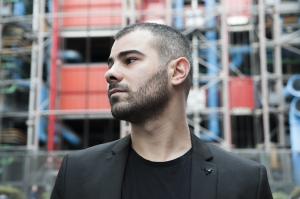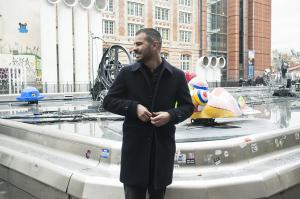Eugen JEBELEANU
Stage director
Eugen received a production grant for his show Itinéraires, un Jour le Monde Changera.
What is your artistic background ?
I am a director and author. I work in Romania, Germany and France. After studying acting at the National Conservatory of Dramatic Art in Bucharest (UNATC), I continued my studies in France at the Conservatoire National Supérieur d'Art Dramatique in Paris, then took a Professional Master in Directing and Dramaturgy at the University of Paris X Nanterre. In 2010, I founded Compania 28 in Romania, with Yann Verburgh. Between 2010 and 2015, as director and author, I created several shows with the company, among which weredontcrybaby(translated into German and published by Editions Theater der Zeit in 2015), RETOX - Romania is a Western Photocopied Country(text selected in the Eurodram's Palmarès 2014, European network of theatrical translation) and Elle Est un Bon Garçon. In 2015, I was invited by the Gong Theatre in Sibiu to create Aliceby Yann Verburgh. Since 2016, I have been associated with the National Theatre of Sibiu, where I directed Lars Nören's Le 20 novembre, Familles(my last text) and Vue du Pontby Arthur Miller. In 2017, I directed R.W. Fassbinder's The Goatat the National Theatre of Stuttgart in Germany and Ogresby Y. Verburgh, with whom I founded the Compagnie des Ogres. In 2018, at the invitation of the Comédie de Valence-CDN, I directed Digital Nativesby Y. Verburgh and Dea Loher's Life on Roosevelt Square at the Wilhelma Theater in Stuttgart. This season, I am taking my first steps in filmmaking, directing, with a feature film that won the CNC production aid in Romania. My productions are programmed in numerous festivals in Romania, Poland, Denmark, Germany and Moldova. In France, my creations are shown at Théâtre Ouvert, Tinel de la Chartreuse, Théâtre de Vanves, CDN de Caen, CDN de Béthune, Théâtre Joliette in Marseille, Théâtre de la Ville pour les Chantiers d'Europe and Festival Actoral.
How do you see your profession today ?
Since 2010, I have been directing fables that deal with social issues, political and social subjects, in order to question the notions of social norms, identity and freedom. Coming from Romania, which lived under a dictatorial regime for several decades, I belong to the generation that was built on the fall of this system and which bears its legacy: an ideological straitjacket that imposed a single way of thinking. In fact, my artistic approach is to give voice to anonymous individuals, non-heroes who do not belong to the majority and who do not adhere to the ‘dominant culture’. I wish to build a theatre that is open to minority voices, to those on the margins, to revolts against systems that oppress our initiatives in order to affirm our freedom of expression. Today I live between France and Romania and I am building on the rubble of the past, that of my family and that of my country, but with the conviction that there is still a possibility of building bridges between these two cultures, beyond prejudices, limits and value judgements. Itineraries, One Day the World Will Changeis for me a project as a necessary response to all these questions about the world today. In view of the great movements of demonstrations that have taken place over the last two years in Romania against corruption and which represent the largest popular protest since the fall of communism, I want to give voice to these young people fighting for their rights and their place in a fairer world. My work as a director has led me in recent years to work in Romania, France and Germany, at the heart of three different cultures, directing actors in three different languages. Today, I would like to bring these worlds and languages together on the same stage with the aim of creating a common language, a language of diversity in which languages will confront, understand and respond to each other.
How do you see yourself in five years ? In 10 years ?
My dream is to continue to awaken emotion in the audience, through theatre or cinema, to offer them a prelude to life and to continue to make the voices of people on the margins of society heard, to fight for their rights and freedom of expression. I would like to move intercultural borders, create more links between territories, meet strangers, and share knowledge. I would like art to always be necessary for the development of our society, to be able to bring critical thinking to current events and to be our (only) weapon of resistance against the dangers that are lurking near us.
This interview was conducted in 2019
Photo credit: Amandine Besacier


